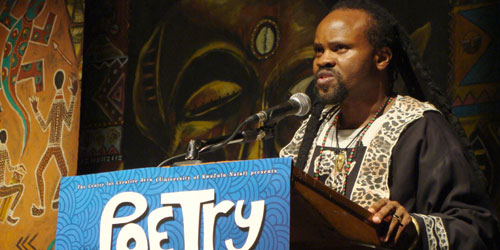
Bantu Mwauru
I wish to say a few words about Bantu. Specifically on Bantu’s, Ndungi Githuku’s and their dedicated team’s role in drama therapy at Langata womens prison. Bantu and team embraced the open door policy of the prisons by pioneering the use of drama therapy to bring the prisoners and staff to a level where they could live together by accepting that in addressing their pasts and presents they could see in each other not just prisoners and prison officers but women whose only difference was the colour of the uniform they wore.
The drama therapy involved a process of walking the prisoners through an examination and acceptance of the crimes that brought them to prison, a critical look at the shortcomings of the criminal justice system in Kenya, a reflection on how they were received into prison – the beatings by the staff and the bullying by the other prisoners – an assessment of what the prison reforms and open door policy meant for them and how best to safeguard the gains of the prison reform programmes.
The prison officers in turn went through a similar process – they examined the reasons they joined the prisons as staff, how they were received and inducted into the prison – the bullying by the older staff and the induction that a prisoner was subhuman and should be treated as such – an assessment of the prison reforms and why the staff resented the open door policy and felt the prisoners were getting all the “attention” from Moody.
Bantu and Ndungi were a sight to behold – in a women’s prison which men previously men could not access were these dreadlocked men animatedly drawing out the prisons dark secrets that no one had talked about before; all the hate, malice, injustice, the occasional flashes of a humane touch,mercy, empathy. Bantu crafted the stories into a script as Ndungi recorded the documentary with his multiple cameras. When the actresses, who were, in the real sense playing themselves got onto stage and acted out their roles the prison began to heal and emotion flowed. Prisoners were able to walk up to officers and tell them you did not have to do that to me and officers told prisoners how difficult it was to show humanity when they themselves felt undignified in the shacks that they shared. It was not all hugs and kisses all round though. Some of the staff were genuinely angry at the project and the painful processes involved.
Wanini Kireri was then officer in charge of Langata. ( she is now in in charge of the Shimo la tewa maximum mens prison) Many prison officers warned her that she would not be able to handle what Bantu, Ndungi and team left behind in terms of ” living happily ever after” expectations of the staff and prisoners. After all nothing had changed, no new staff houses or lessened sentences for the prisoners. But the psychological and emotional barriers had been broken; it worked and Langata became a role model for reform through coordinated prisoner and staff teamwork. The prisoners and staff were to act out this script for many different audiences, including lots of people from civil society and faith based organizations, Maina Kiai then Chair KNCHR and Tirop then Commissioner KNCHR, Rebecca Nabutola, Koigi Wamwere and of course Moody Awori. The then Commissioner Kamakil shed tears when he watched it – it was that real.
Just before Moody left we organized ( then as KNCHR) a meeting for all senior officers in the Prisons to assess the impact of the prison reforms from a human rights perspective with a team from IED, LRF, RWI and Bantu. Our evaluation was based on what impact we had from a knowledge, skills and attitude change perspective. When Bantu rose to speak he asked them to admit him as a prisoner and through this process addressed their biases towards prisoners based on their looks and poor backgrounds. They told him they would treat him badly because of his dreadlocks, strange name, funny shirt and dusty sandals. They were shocked when we told them he had a PHD – he used his own example to explain how so much of what is needed in prison reform was about attitude change and that it costed nothing.
The last time I met Bantu at the National theatre I teased him that his “fans”at the prison were missing him and we talked about the possibility of creating more “fan bases” particularly in the mens prisons. We left it at that. Wanini called me on Monday – telling me that Bantu had passed on and that she had asked the staff in Langata to break the news to the prisoners gently. This morning I told her I was going to send in something to this listserv and she said “tell them that Bantu gave us hope – he let us tell our story and he achieved so much change. He never made us feel that he was imposing his own ideas, he was so humble. As a result of the drama therapy It became really ‘uncool’ for officers to beat prisoners or for prisoners to treat staff with disrespect. He made us realise how much we needed each other as staff and prisoners – how we completed each other. I personally will always be grateful to Bantu and his team for making all of us in Langata realize that we can be the change we want to see in the prison”
[Editors’ note: Bantu Mwauru, Kenyan artist, activist, academic, died April 26. Pambazuka this week published Shailja Patel’s “The Man With the Mau Mau Spirit: Remembering Bantu Mwauru”, http://pambazuka.org/en/category/comment/55979, and Alice Nderitu’s reminiscence of Bantu and Ndungi Githuku’s work at Langata women’s prison. Alice Nderitu is Director of Fahamu’s Education for Social Justice programme. Thanks to Pambazuka for their great work and labor, and for sharing this piece with us.]
(Photo Credit: CapitalFM)